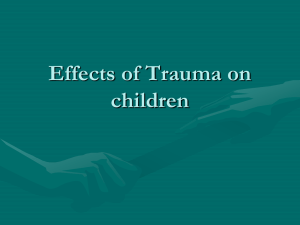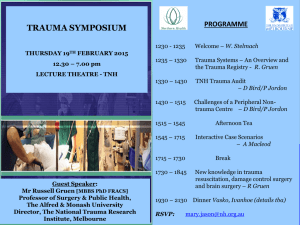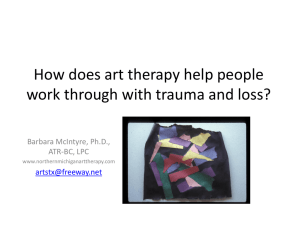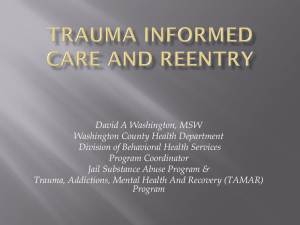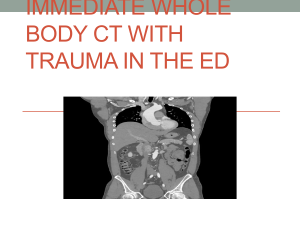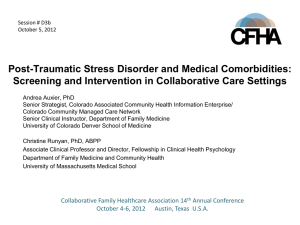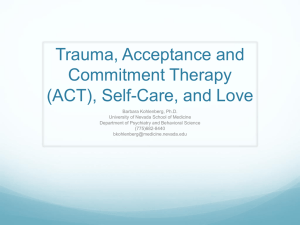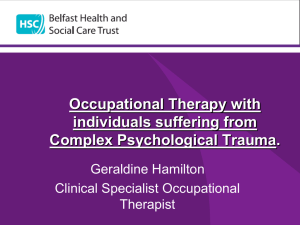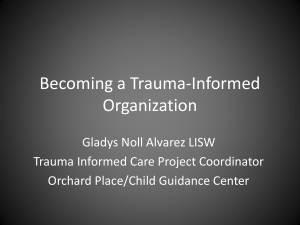New Advances Complex Trauma
advertisement
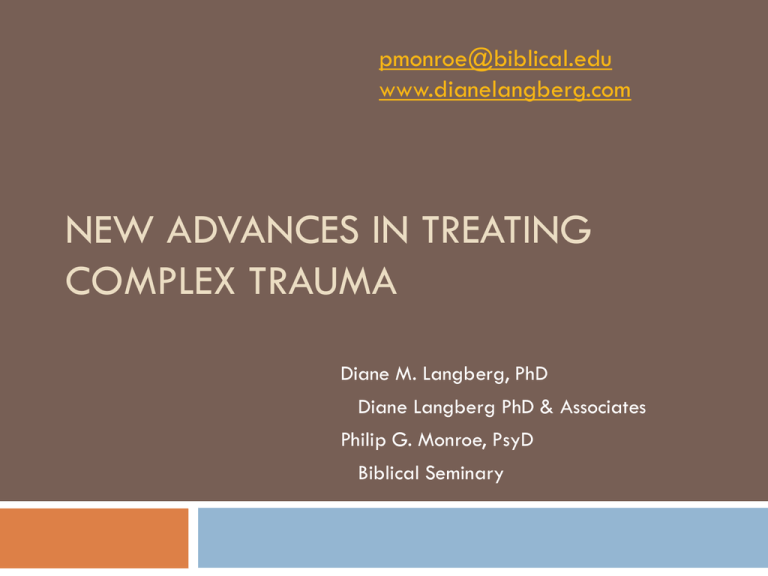
pmonroe@biblical.edu www.dianelangberg.com NEW ADVANCES IN TREATING COMPLEX TRAUMA Diane M. Langberg, PhD Diane Langberg PhD & Associates Philip G. Monroe, PsyD Biblical Seminary Session Outline Defining Complex Trauma CPTSD Review Diagnostic Differentials Interventions: Talking, Tears & Time Safety & Stabilization Telling the Story Grief & Lament Self-Care Strategies for Renewal Trauma turns complex when: Terror goes beyond typical PTSD Stressors are interpersonal, premeditated, planned and caused by humans Stressors are repeated and chronic in nature Victims are exploited by “caregivers” A new diagnosis? Complex Trauma Judith Herman, Trauma and Recovery Type II PTSD Lenore Terr, Too Scared to Cry? Disorders of Extremes Stress (DES NOS) Besel Van der Kolk, Trauma Center Complex trauma alters a person’s 1. 2. 3. 4. 5. 6. 7. Ability to regulate affect and impulses Attention and consciousness Self-perception Perception of the perpetrator Capacity for relationships Body and brain responses Perception of meaning and faith Differential Diagnostics Complex PTSD, PTSD, BPD, or Complicated Grief? Common trauma experiences Intense fear, paralysis/helplessness, inability to effect any change, threat of annihilation, leading to experience of, Loss of voice, control, connection, and meaning, resulting in, Disorganized physical, cognitive, and emotional response system thereby increasing, Relational pain, distrust, self-contempt, overwhelming anxiety, evidenced as, Running from the past, afraid of the future Overlapping diagnoses Posttraumatic Stress Disorder (PTSD) Complex PTSD (C-PTSD or DESNOS) Borderline Personality Disorder (BPD) Complicated Grief (CG) Major Depression Generalized Anxiety How do you tell the difference? Traumatic Symptoms BPD (DTD?) PTSD Prolonged DESNOS Grief C-PTSD Trauma Depression Key differentials DESNOS Anxiety Complicated Grief Primary Affect: Panic and pain Worry Intrusive sad or guilty thinking Relationships: Passive, avoidance, revictimization Varies; trust Loss of prerelationships likely existing good coping skills Dissociation: Present Not likely Not likely Cognitive Focus: Fear Future dangers Loss Self: Consistent self loathing External focus, Compare/ self in background contrast with self prior to loss TIME: Key factor in determining intensity of diagnoses The biology of trauma? Amygdala + Hippocampus + Cingulate Arousal + Evaluate + Decide Michael Lyles: accelerator, no brakes, no steering Hypothalamus + pituitary + adrenal Cortisol/stress feedback loop In PTSD: low cortisol but more frequent “radar” results in overreaction to weak “signals” and no correction back to norm Treatment Overview talking, tears, and time Safety & stabilization Foundation for all treatment Longest phase and vital to positive outcomes Features Alliance building; support networks Coping; grounding Education about the nature of trauma Avoid forced telling or catharsis Initial goals Increase client self-reflective capacities and compassion for the struggle Support appropriate boundaries Increase positive coping skills and support network Why talk? Truthfully telling of a silenced narrative At right place, improves client self-efficacy Tells the whole story Supports grieving well Brings faith and experience together Talking dangers Pushing or avoiding the story Believing that telling the story is what heals Seeking catharsis alone Complex Trauma in the Church Educating the Church, Connecting Victims to God Educating the Church What might it mean if CT clients appear to be resistant, refusing good advice, yet dependant at the same time? Are they sinfully anxious? Are they demon possessed? Are they rebellious? Are they refusing to forgive or get better? Caring church leaders may grow weary in well-doing Educating the Church: key areas Develop a theology of oppression to explain impact of trauma Failure to love violates the imago dei, true religion 5 facets of oppression (the opposite of love) Abuse of power Deception and false teaching Failure to lead Objectification Forced false worship See my “The nature of Evil in CSA: Theological considerations of oppression and its consequences” in the 2012 Schmutzer, A (ed.) The Long Journey Home: Understanding and Ministering to the Sexually Abused. Wipf & Stock. Educating the Church: key areas Develop a larger view of healing What constitutes healing? How do we participate in God’s healing? Support? Mercy? Prayer? Listen? Play? Remember: some healing is immediate, other healing grows day by day Educating the Church: key areas Explore ancillary themes: forgiveness, reconciliation, restoration, restitution, etc. What is the rush? Why forgiveness now? Point in time? Attitude? Why reconciliation now? What bothers us most about brokenness? What does repentance look like? What about restitution? Lament An Intervention for Counselors and Clients What is Lament? Canonized complaints to God Lamentations includes Complaint against sin and destruction Agony over personal/corporate sin (in children of God and heathen) Questioning God Waiting expectantly for answers Worship Does lament resolve hurt/anger? Answers from Scripture? Answers from Science? Counselor Self-Care Preventing Vicarious Trauma; Some Directions for Church Leaders Vicarious trauma “Trauma is contagious” Bearing witness leads to hopelessness, questions of faith, and fear in relationships Temptation: withdrawal or intrusive action VT defined: (Saakvitne & Pearlman) transformation of the therapist's inner experience as a result of empathic engagement with another’s trauma Transforming the Pain Tend your garden To last the long haul without damage, tend to: Self-care Relationships Faith A temptation to avoid self-care? I find many therapists feel guilty pursuing beauty and peace and order in their own lives... It is as if somehow they should not have good in their lives while others suffer. However, the Word of God says that He gives us richly all good things to enjoy. To turn from such things is to turn from the gifts in His hand. For additional resources www.dianelangberg.com Books, CDs, bibliographies on related topics Opportunities for case consultation www.wisecounsel.wordpress.com Phil’s personal and professional musings Contact information: pmonroe@biblical.edu

